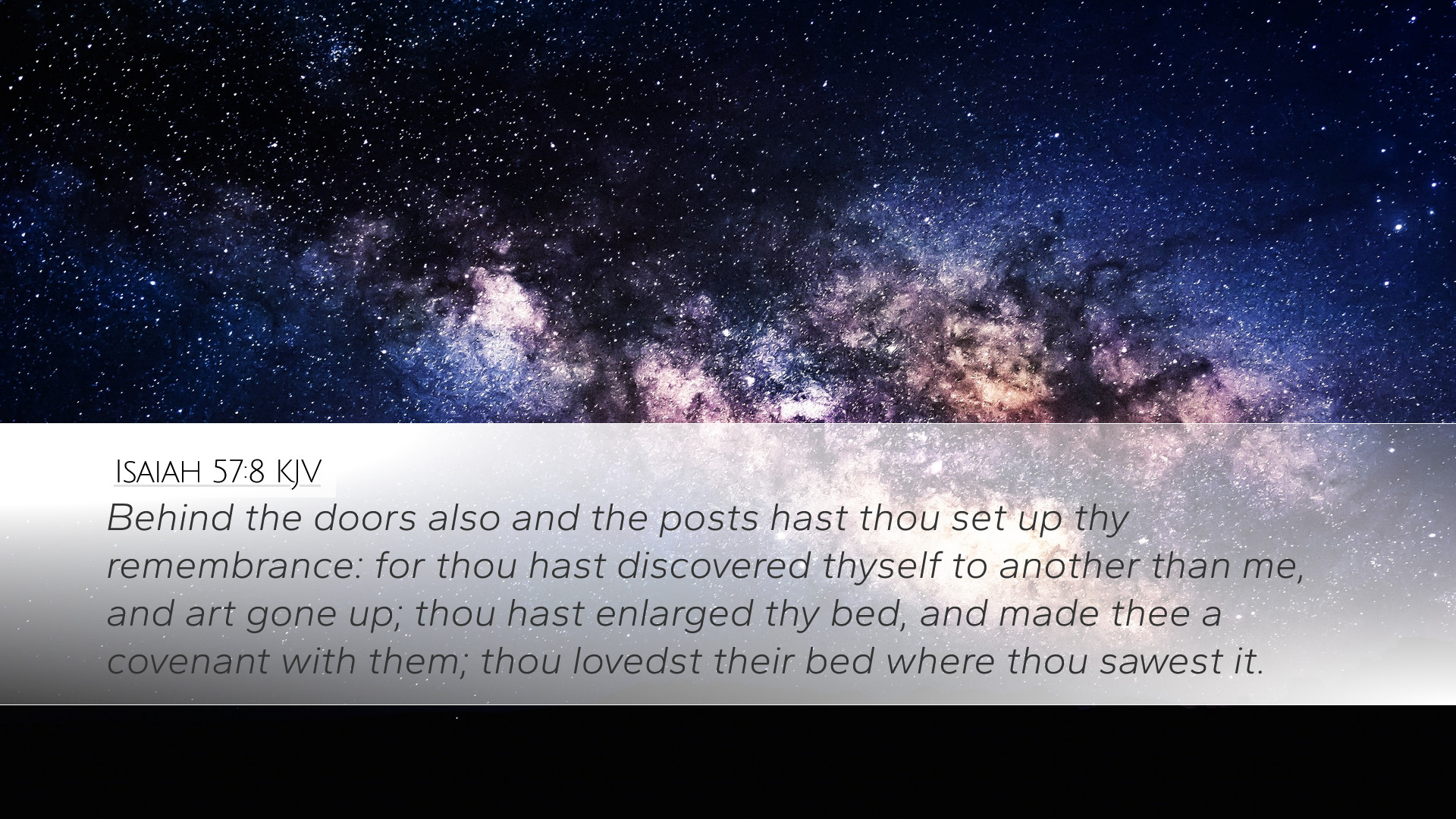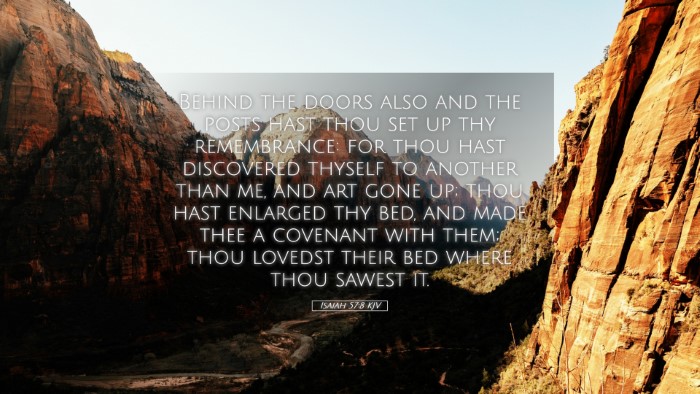Commentary on Isaiah 57:8
Verse Context: Isaiah 57:8 states, "Behind the doors also and the posts hast thou set up thy remembrance: for thou hast discovered thyself to another than me, and art gone up; thou hast enlarged thy bed, and made thee a covenant with them; thou lovedst their bed where thou sawest it." This verse addresses the spiritual adultery of Israel, wherein idolatry and unfaithfulness to God are vividly illustrated.
Overview of Insights
The verse serves as a poignant illustration of Israel's betrayal of God, utilizing imagery that reveals the depth of their infidelity. Various public domain commentaries shed light on the nuances within this passage, emphasizing themes of covenant, idolatry, and divine judgment.
Analysis from Matthew Henry
Spiritual Adultery: Matthew Henry remarks on the metaphor of "remembering" as akin to idol worship. The "doors and posts" represent places of worship that were set up to honor false gods, signifying a deliberate act of turning away from Yahweh. This detail points to the extensive efforts the Israelites made in their idolatrous practices, which illustrates their spiritual decline.
God's Grievance: Henry further analyzes God’s grievance over Israel's actions. He argues that the act of expanding one’s bed is a metaphor for indulgence in sin and the pursuit of earthly pleasures at the expense of divine allegiance. The covenant mentioned denotes an agreement between the Israelites and their idols, contrasting sharply with the divine covenant founded on loyalty to God.
Insights from Adam Clarke
Idolatry's Roots: Adam Clarke provides a thorough exposition on the various forms of idolatry present in ancient Israel. He explains that the "remembrance" set behind doors signifies not only a private acknowledgment of idols but also a public sham. These hidden practices lead to social degradation and reveal the lack of true piety among the people. Clarke underscores the psychological aspect of turning away from God, indicating a lack of reverence and the fulfillment of carnal desires.
Consequences of Infidelity: Clarke also highlights the consequences faced by the Israelites for their idolatry. He stresses that their departure from God precipitates divine judgment, illustrating that consistent disobedience leads to alienation from divine favor. The "covenant" made with idols reflects a turning point where the Israelites are no longer seen as a faithful people but as religious compromisers.
Reflections from Albert Barnes
Symbolism of Space and Ritual: Albert Barnes comments on the symbolism of the "bed" and its elaboration, indicating that it represents intimacy with idolatrous practices. According to Barnes, the "enlargement" of their bed signifies an embrace of sin without restraint, further indicating that this is not an isolated act but a systematic embrace of multiple idols.
Rhetoric of Divine Judgment: Barnes notes that God's rhetorical question regarding their actions emphasizes the absurdity of their infidelity. He argues that the Israelites’ choices reflect a willful blindness to the truth of God’s character and His commandments. The language used in this verse serves to evoke a sense of urgency and moral awakening among the hearers, calling them back to genuine faithfulness.
Theological Reflection
The implications of Isaiah 57:8 extend far beyond its historical context, resonating with contemporary believers. The modern church faces similar challenges with idolatry—though often less tangible, they manifest in materialism, secularism, and moral relativism. As pastors and theologians reflect on this passage, they must consider how the allure of modern-day idols tempt congregations away from their commitment to God.
Applying the Message Today
- Call to Authentic Worship: Like the Israelites, modern believers may struggle with hidden forms of idolatry. This passage serves as a warning to assess our own lives and societal values.
- Encouragement to Covenant Faithfulness: The language of covenant underscores the seriousness of commitment to God. Pastors can use this to urge their congregations to renew their vows of fidelity to God amidst cultural distractions.
- Awareness of Consequences: There is a need to recognize that straying from God brings real consequences. This aspect of the verse encourages a return to reverence for God’s commandments and the seriousness with which we should take our relationship with Him.
Conclusion
Isaiah 57:8 carries with it timeless lessons about fidelity, commitment, and the dangers of idolatry. Commentaries by Matthew Henry, Adam Clarke, and Albert Barnes provide a rich tapestry of insights that can guide contemporary understanding of this powerful text. For pastors, students, and scholars, engaging deeply with this verse not only enhances one’s understanding of Scripture but also fosters a necessary self-examination regarding the fidelity of one’s walk with God.


